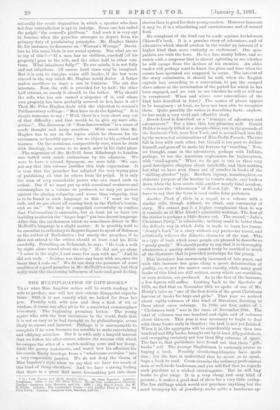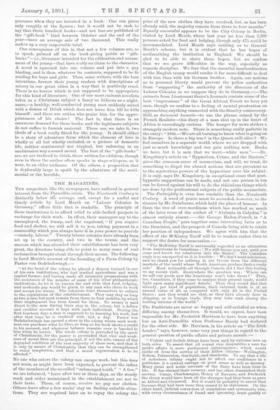THE MULTIPLICATION OF GIFT-BOOKS.*
THAT what Miss Ingelow writes will be worth reading, it is safe to predict; nor will her new volume disappoint expecta- tions. Still, it is not exactly what we looked for from her pen. Prettily told, with now and then a flash of wit or -wisdom, it turns out after all to be a somewhat commonplace love-story. The beginning promises better. The young squire who, with the best. intentions in the world, finds that it is not so easy as he had thought to be philanthropic, seems likely to amuse and instruct. Perhaps it is unreasonable to complain if he soon becomes too sensible to make entertaining and edifying mistakes. But it is with only a languid interest that we follow his after-career, admire the success with which he escapes the wiles of a match-making aunt and her decoy. duck, the pretty Antoinette, and watch how his affection for his cousin Emily develops from a "wholesome aversion" into a very respectable passion. We do not deny the charm of Miss Ingelow's style when we say that we have too much of this kind of thing elsewhere. And we have a strong feeling that there is a great deal more lovemaking put into these (1.) Very Young, and Quite Anoilior Story. By JetIll Bigelow. London: Longman. 14)0,—(2.) Tho S/ove Prince. By the Veil. Archdeacon Chiswelt. London : Sampson Low, Marston, and Co. 100.—(k) Rattch.Laint, By W. B. Gilpin. London : The Loadonhall Press,—(4.) Another /look of Gies. By Nora Perry. London : Sampson Low, Marston, and Co.
stories than is good for their young readers. However innocent it may be, it is a stimulating and unwholesome sort of mental food.
No complaint of the kind can be made against Archdeacon Clhiswell's book. It is a genuine story of adventure, and of adventure which should awaken in the reader an interest of a higher kind than` mere curiosity or excitement. Our sym- pathies are with the hero. He is a fine, manly fellow, and we watch with a suspense that is almost agitating to see whether he will escape from the devices of his enemies. An older reader will perhaps want to know the place and time when the events here narrated are supposed to occur. The interest of the story culminates, it should be said, when the English captain has, according to a convention, to put the escaped slave ashore at the termination of the period for which he has been engaged, and we wait to see whether he will or will not be recaptured. When and where were conventions of the kind here described in force ? The names of places appear to be imaginary ; at least, we have not been able to recognise them. Quite possibly the writer is describing facts ; anyhow, he has made a very vivid and effective story.
Ranch-Land is described as a "romance of adventure and adventurers." For a time, this, too-, promises well. Gerald
Holder is nearly killed at a steeple-chase, run in the grounds of the Seabrook Club, near New York, and is nursed back into life by the unwearied ministrations of Miss Stella French. The two fall in love with each other, but Gerald is too poor to declare himself, and goes off to make his fortune by "ranching." Now, we thought, come in the adventures, perhaps with Indians, perhaps, to use the American euphemism for highwaymen, with "road-agents." What we do get is two or three very good descriptive chapters about ranch-life, and then nothing but what we have seen times out of number in books of the "shilling-shocker" type. Murders, bigamy, manslaughter, an obdurate purpose of the heroine to remain single, only broken down when the hero meets with another nearly fatal accident, —these are the " adventures " of Ruch-Life. We must take leave to say that the term is used under false pretences.
Another Flock of OirZs is a sequel to a volume with a similar title, though without, we think, any continuity of story. We • cannot pay it a higher compliment than to say it reminds us of Miss Alcott's admirable writings. The first of the stories is perhaps a little drawn out. The second, "Julia's Christmas Party," is admirable ; nothing could be better than the delicate way in which Julia is made to learn her lesson, "Jenny's Lark" is a story without any particular moral, and artistically relieves the didactic character of the rest. This is a type of book which some people are pleased to describe as "goody-goody." We should prefer to say that it is thoroughly wholesome, a quality which cannot truly be ascribed to much of the literature that is provided nowadays for the young.
This literature has enormously increased of late years, and with this increase has gone along a great deterioration of quality, or, to put the matter more exactly, while many good
books of this kind are still written, many which are worthless, or even noxious, are produced. As to the fact of the increase,
a few figures will suffice. Looking back to the Spectator of 1870, we find that on November 2Gth we spoke of one of Mr. Plenty's tales as "one of the first-fruits of the great Christmas harvest of books for boys and girls." That year we noticed about eighty volumes of this kind of literature, devoting to them about seven columns. In 1880, our first notice of a "Christmas book" was in the issue of November 20th. The total of volumes was one hundred and eight, and of columns about thirteen. This year it was necessary to begin to deal with these. books early in October ; the task is not yet finished.
When it is, the aggregate will be considerably more than two hundred and fifty books, brought out by at least ,fifty publishers, and occupying certainly not less than fifty columns of space. The fact is, that publishers have found out that these " gift- books " sell. The average Englishman is curiously averse to buying a book. Possibly circulating-libraries have spoilt him ; but the fact is undoubted that he never, so to speak, buys a book to read. Cross-examine the ordinary professional man or well-to-do tradesman, and you will find that he regards such purchase as a wicked extravagance. But he will buy books to give away. It is a very cheap and easy kind of present ; it makes a good deal of show for a very little outlay. The few shillings which would not purchase anything but the most trumpery bit of jewellery, make quite a handsome ap- pearance when they are invested in a book. One can guess only roughly at the figures ; but it would not be rash to say that three hundred books—and not less are published of the " gift-book " kind between October and the end of the year—have an average sale of two thousand. This really makes up a very respectable total.
One consequence of this is, that not a few volumes are, so to speak, palmed off on the book-giving public as " gift- books "—i.e., literature intended for the edification and amuse- ment of the young—that have really no claim to the character. A novel is squeezed into one volume and put into a gay binding, and is then, whatever its contents, supposed to be fit reading for boys and girls. Then some writers, with the best intentions, harrow their young readers with descriptions of misery in our great cities in a way that is positively cruel. There is no horror which is not supposed to be appropriate for this kind of literature. One of our most eminent novelists takes as a Christmas subject a fancy as hideous as a night- mare,—a healthy, well-conducted young man suddenly seized with a demon of Drink which does not leave him till he kills himself : and there are critics who praise him for the appro- priateness of his choice ! The fact is, that there is an enormous demand for these books, and the legitimate subjects do not suffice to furnish material. There are, we take it, two ideals of a book really fitted for the young. It should either be a story of adventure from which the element of love is wholly or all but wholly excluded, or a picture of domestic life, neither sentimental nor tragical, but enforcing in an unobtrusive way a sound moral. The best of the "gift-books" are, we are inclined to think, those written for children, though even in these the author often speaks in stage-whispers, as it were, to an elder audience. Of the others, a proportion that is deplorably large is spoilt by the admixture of the senti- mental or the horrible.















































 Previous page
Previous page